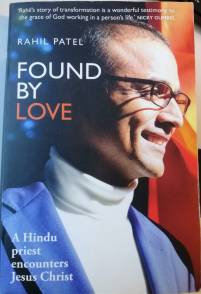I began my year 2023 by reading Rahil Patel’s Found by Love. As the subtitle suggests it is the story of a Hindu priest’s encounter with Jesus Christ.

Rahil’s story takes the reader on a journey through a diverse cultural, geographical and religious landscape. From inheriting a silver spoon from parents to disobeying them in order to pursue a higher calling, quickly rising to the echelons of religious power, just to experience the inner restlessness and disappointment at not being able to experience true love and care, Rahil’s journey is marked with all the highs and lows, of adventures and frustrations that often come following them.
What stood out for me was that despite all his grievances and hurts, which must have made writing such a book so difficult, Rahil exhibits a decency and composure that aligns well with his claim to have experienced a 180 degree turn in his life. Not even once, Rahil comes out as angry towards those who had hurt him. The book is clearly not written with an agenda to settle scores nor to defame people or the organisation that he was once part of. In fact, he never mentions the name of the organisation in his book.
If anything, Rahil’s story focuses on his hunger that is ultimately satisfied by the Bread of Life. It is the story of a Hindu priest who was found by love. Throughout his story, Rahil stresses that his ‘conversion’ was an act of this unknown God who was at work in his life long before he came to know Him. This undoubtedly goes against the grain of our times, where both postcolonialists and the religious nationalists constantly try to convince us (with their own techniques and power) that conversion is the result of highly deceptive and manipulative human techniques and power. Rahil’s story (like many other stories) prove that the effort to politicise conversion is a futile kicking against the goads.
One can only hope for more stories like Rahil’s to deconstruct the powerful narrative that has been fiercely enforced across South Asia, the narrative that unduly delegitimises all conversions, and sabotages the voices of the converts themselves. India is full of stories like that of Rahil’s, but they remain unknown and unheard because they are already declared false and dishonest.
We need Rahil’s story, to summon our presumptions, prejudices and biases to contest, and, for once, to challenge us to see the truth for what it is. We need Rahil’s story to motivate us to push the debris aside and clear space for other stories that remain unknown and unheard, to become audible and visible. We need Rahil’s story, and we need it in many more languages, so that it can reach hearts that are indeed waiting to be found by love.





